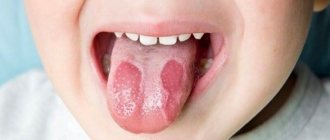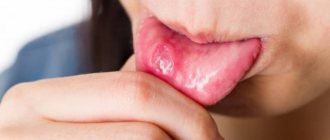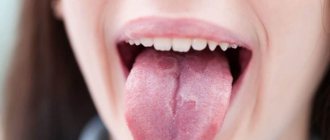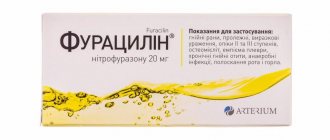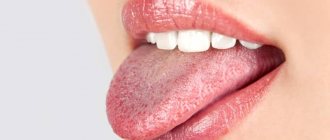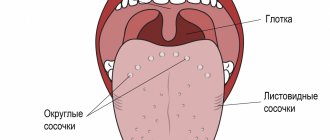Stomatitis: features of the disease
Stomatitis is a disease related to dental pathologies in which inflammation of the oral mucosa occurs. Infection of the tongue with stomatitis in adults is also called “glossitis.”
The inflammatory process affects the mucous membrane and causes severe symptoms:
- redness and swelling of the tongue;
- formation of white plaque;
- severe pain;
- the formation of many small blisters and ulcers.
Due to severe sensitivity and soreness of the tongue, the patient cannot eat food, fever, insomnia and irritability are possible.
Stomatitis under the tongue in adults, as in other parts of the oral cavity, is classified into two types.
- Aphthous. A form of inflammation in which the tongue becomes covered with papules and ulcers that turn into erosions (aphthae).
- Herpetic. The inflammatory process is manifested by swelling and redness of the tongue. Small bubbles are localized in groups.
Prosthetic stomatitis and ulcerative-necrotic form of pathology are extremely rare.
Without treatment, the signs of stomatitis completely disappear, but this does not mean that the patient is cured of the pathology. The inflammatory process becomes chronic and when the immune system is weakened or exposed to an irritant, a relapse occurs.
Traumatic factor
Every person can experience mechanical damage to the tongue. It could be:
- biting;
- regular use of a rough toothbrush;
- damage during dental therapy;
- tissue damage from teeth, dentures, braces;
- irritation from food or medications.
Treatment of tongue sores resulting from injury occurs quickly and without complications. For the first few days, the damaged mucous membrane will react to all irritants. But the reaction will become less and less every day, and over time it will completely disappear.
Causes of stomatitis
Stomatitis under the tongue in adults is a reaction of the immune system to certain types of irritants, which are any substances. The causes of stomatitis have not been clearly identified; presumably, the body exhibits an individual reaction to certain substances or microorganisms.
Possible causes of stomatitis on the tongue in adults:
- bacteria and infections of the oral cavity (caries, gingivitis, periodontitis, etc.);
- diseases of the gastrointestinal tract of an infectious or viral type;
- respiratory diseases (ARVI, influenza, etc.);
- frequent injury to the tongue by orthopedic or orthodontic structures;
- damage to the tongue due to a chipped tooth;
- fungal infection;
- bad habits (smoking or alcoholism);
- burning the tongue or eating “spicy” foods.
In addition to the listed causes of stomatitis on the tongue in adults, inflammation of the mucous membrane can be caused by the herpes virus (herpetic stomatitis).
Differentiation of plaque in gastritis from other diseases of the gastrointestinal tract
A thick, grayish coating is characteristic of dysentery.
It is important to suspect the onset of a dangerous disease in time. To take action and prevent complications from occurring. Differential diagnosis by tongue of gastritis from other diseases and conditions:
- A thick, grayish coating is characteristic of dysentery. In this case, the tongue looks cracked, and less saliva is produced than usual.
- Desquamative glossitis - this type of inflammation of the tongue is characterized by such symptoms as red spots of complete absence of epithelium or several altered taste buds on the tongue, covered with a white coating.
- Galvanic stomatitis is a form of inflammation of the tongue that arises as a result of a reaction to metal prostheses, manifested by spots in the form of pimples, and subsequently by the appearance of erosions against a background of white plaque.
- Infectious diseases - sore throat, scarlet fever, diphtheria, HIV infection can cause the appearance of a white coating on the tongue, but almost all of these infections are accompanied by high fever and skin rashes.
- Diseases of the heart and blood vessels - plaque is located on the anterior third of the tongue.
- Kidney disease - plaque on the tongue is localized at the back along the edges.
- Endocrine disorders - under the plaques of white plaque there are ulcers and erosions.
- Anemia is not a coating on the tongue, but blanching of the entire surface of the organ. Diseases of the respiratory system are often indicated by the localization of white plaque on the front and along the edges of the tongue.
- Diseases of the salivary glands - the appearance of a white coating is accompanied by the appearance of an unpleasant odor.
- Diseases of the liver and gall bladder - the color of the plaque is not white, but has a yellowish or brown tint. A white coating on the tongue can be caused by the consumption of dairy products, as well as the proliferation of bacteria and fungi in those who abuse sweets. Unlike plaque during gastritis, such layers are easily removed and do not form further.
Treatment Basics
If an adult has a swollen tongue, the surface is covered with plaque, or has severe hypothermia, you should consult a dentist. Even in the absence of neoplasms in the oral cavity in the form of papules, ulcers or erosions, a specialist will be able to determine the development of the inflammatory process. With timely treatment, the risk of pathology becoming chronic is minimal.
Treatment of stomatitis on the tongue in adults is carried out exclusively conservatively. Depending on the causes of the disease and the clinical picture, the doctor will determine a treatment regimen and prescribe effective drugs of systemic and local action.
The dentist’s task is not only to eliminate symptoms and inflammation, but also to identify the cause. If the provoking factor has a constant impact, then stomatitis under the tongue will constantly recur.
Treatment of stomatitis on the tongue in adults begins with the relief of concomitant diseases - the root causes.
Signs of deviations from the normal state of the tongue
It is quite possible that, once you look at your tongue, you will see a rather unsightly picture. Symptoms of deviation from the norm:
- A coating of various colors, thicknesses, and with different locations of spots appears on the back of the tongue;
- The sides of the tongue are bright red;
- The taste buds look uneven, some of them increase in size and begin to disturb with unpleasant sensations, taste sensations change, their intensity weakens;
- The oral cavity becomes unusually dry;
- In some cases, the appearance of pain and burning is diagnosed;
- There is an unpleasant odor from the mouth;
- After cleaning the tongue, the plaque appears again after a short time.
In the plaque that appears on the tongue, laboratory testing can reveal leukocytes, pathogenic microflora, and exfoliated epithelial cells.
This video will tell you about plaque on the tongue due to gastritis:
How is the treatment carried out?
Treatment for stomatitis is comprehensive.
- Anesthesia. To eliminate pain, the dentist may prescribe topical medications containing lidocaine or analgesics.
- Antiviral therapy. If the disease is caused by a herpes virus, the doctor prescribes antiviral drugs of the appropriate group of effects.
- Antibacterial therapy. In case of bacterial stomatitis, local treatment of the oral cavity with antiseptic solutions and dental ointments with antibacterial action is mandatory.
- Antifungal therapy. Stomatitis can be the result of fungal activity in the mouth. This form is more common in children, but is not excluded in adults. The specialist prescribes the patient a strict regimen of antifungal drugs.
- Anti-inflammatory therapy. It is carried out in cases of severe inflammation. The dentist recommends taking anti-inflammatory systemic drugs that have a targeted effect depending on the pathogen or cause of tongue stomatitis.
- Diet. Patients with stomatitis are prescribed a diet that excludes foods that can aggravate irritation of the mucous membrane and tongue. So dentists recommend avoiding hot, spicy, sour and salty foods. Smoking and drinking alcohol should be avoided.
Together with the treatment of stomatitis, treatment of diseases of the respiratory system, gastrointestinal tract, inflammation of the gums, caries, etc. can be carried out.
Why does my tongue hurt?
Physiological reasons
Pain in the tongue is often the result of minor injuries: superficial burns from too hot liquid, accidental biting, damage from hard pieces of food, fish bones.
Painful sensations are combined with numbness or, on the contrary, hypersensitivity. They disappear within a few minutes or hours, less often – days. Burning and sore tongue can also be caused by eating spicy foods, certain spices, or drinking strong alcoholic beverages. In people who smoke, the sensitivity of the tongue increases due to the constant effect of tobacco smoke on the mucous membrane, which leads to the frequent occurrence of pain under the influence of other irritants.
Traumatic injuries
More serious injuries occur due to biting the tongue during an attack of epilepsy, sports, or accidents. Abrasions and wounds in the form of teeth marks are found on the tongue. Depending on the severity of the damage, pain lasts from several days to 1-2 weeks. In patients with incorrectly selected orthodontic structures or poorly fitted removable dentures, pain becomes the result of chronic irritation of the tongue. With advanced caries, the organ is systematically injured by the sharp edges of the teeth.
Glossitis
Pain syndrome is not observed with all glossitis; it is more typical for infectious lesions. The inflammatory process of bacterial etiology is manifested by hyperemia, swelling, increased local temperature, aching, raw pain. With viral glossitis, blisters form, which subsequently open to form painful erosive defects.
Tongue pain
Abscess and phlegmon of the tongue
An abscess develops against the background of microtrauma or becomes a complication of bacterial glossitis. Characterized by rapid onset and progression of symptoms. Superficial abscesses are localized under the mucosa, usually in the back area. They represent an area of limited swelling with a painful thickening in the center. They are accompanied by sharp pain when moving the tongue, swallowing, and sometimes radiating into the ear.
Deep abscesses are located deep within the organ. They manifest themselves as hyperthermia, intoxication syndrome, in some cases – chills, enlarged regional lymph nodes, and excessive salivation. The tongue is so swollen that it can hardly fit in the mouth, making speech and breathing difficult. The pain is sharp, jerking, bursting, pulsating, aggravated by movement, swallowing, or touching.
In patients with phlegmon, the area of purulent inflammation is not limited, quickly spreading to the entire tongue, floor of the mouth, and neck. Febrile fever, chills, and regional lymphadenitis are observed. The pain syndrome is intense, diffuse, depriving sleep. Eating is very difficult or impossible. Speech is slurred. Due to the blockage of the airways due to swelling of the soft tissues of the oral cavity and oropharynx, attacks of suffocation develop.
Oral candidiasis
Painful sensations are more often observed in acute candidiasis, but are not typical for the chronic form of the disease. Children, old people, and weakened patients with severe somatic pathologies suffer. A loose or dense milky-white cheesy coating forms on the tongue, spreading to the palate, cheeks, and lips. When plaque is removed, a bleeding, eroded or macerated mucous membrane is exposed.
When eating food, pain and burning occur. In the absence of therapeutic measures, transformation into atrophic candidiasis is possible. The tongue becomes shiny, fiery red. The papillae atrophy. The mucous membrane of the oral cavity is swollen, hyperemic, dry, thinned. Patients complain of severe pain in the affected area. Plaque is not detected or is insignificant.
Glossalgia
Glossalgia is a pathology accompanied by unpleasant sensations in the tongue in the absence of organic changes. Occurs in diseases of the liver and gastrointestinal tract, vascular, endocrine diseases, pathologies of the central and peripheral nervous system. Painful sensations without clear localization, diffuse, have a burning, pinching or sore character, are more pronounced in the area of the tip and sides, less often appear on the root and back of the tongue. May be episodic or regular. As a rule, they are combined with neurotic disorders.
Xerostomia
Pain in the tongue is a concern in the final stages of the disease. Against the background of complete inhibition of the function of the salivary glands, glossitis develops. Constant dryness of the mucous membrane leads to the formation of erosions and ulcers. Painful sensations intensify when talking, while eating, and are combined with constant dry mouth. Patients with xerostomia may have multiple caries.
Neuralgia
Pain in the two anterior thirds of the tongue is characteristic of damage to the third branch of the trigeminal nerve (n.mandibularis), combined with painful sensations in the chin, lower jaw, lower lip, gums, and buccal mucosa. The pain syndrome is paroxysmal in nature and is a series of impulses resembling an electric shock. It is provoked by cold influences, shaving, chewing, speech, laughter.
With neuralgia of the glossopharyngeal nerve, pain appears at the root of the tongue, from where it spreads to the tonsils, soft palate, pharynx, and sometimes to the ear, eye, and lower jaw. The attack is provoked by swallowing, chewing, yawning, coughing, talking, and is accompanied by dryness in the throat, which at the end of the paroxysm is replaced by increased salivation.
Neuralgia of the hypoglossal ganglion is characterized by pain in the anterior parts of the tongue, the sublingual zone: boring, burning, pulsating, paroxysmal. Lasts from a few minutes to 1 hour. It radiates to the lower jaw, temple, back of the head, side of the neck, shoulder girdle, sometimes to the arm, upper chest. It intensifies when talking, eating, especially rich or spicy food.
Anemia
Pain in the tongue is typical of pernicious anemia and is caused by glossitis. The tongue becomes “varnished” and acquires a crimson color. Weakness, tachycardia, and dizziness are observed. Characteristic symptoms are shortness of breath, pale skin, puffiness of the face. Loss of appetite, hepatomegaly, and stool instability are detected. Neurological disorders are detected: muscle weakness, gait changes, stiffness, numbness of the limbs.
Sometimes painful sensations in the tongue area occur with iron deficiency anemia. Glossitis is combined with dysphagia, angular stomatitis, and atrophic gastritis. The prevailing symptoms are weakness, tinnitus, dizziness, shortness of breath, and palpitations. Dry skin, deformed nails, and hair loss are noted.
Other reasons
Pain in the tongue is sometimes detected in the following conditions:
- Allergy
. Soreness, paresthesia, severe itching are caused by food allergies, less often - by a reaction to plant pollen or animal fur. Combined with sneezing, lacrimation, swelling of the mucous membranes. - Initial stages of cervical osteochondrosis.
Vague pain sensations in the tongue are complemented by awkwardness, restrictions in neck movements, and pain in the neck. - IHD.
Pain in the tongue, oral cavity, and lower jaw can be observed during an atypical course of an attack of angina pectoris or myocardial infarction.
Oral examination
General recommendations
For stomatitis in adults, treatment is carried out on an outpatient basis. The dentist can perform initial treatment of the oral cavity, then the patient will need to perform all the manipulations independently at home.
Antiseptic treatment of the entire oral cavity is a prerequisite for the successful treatment of stomatitis and the rapid recovery of the affected mucosa. For “disinfection”, solutions containing chlorhexidine, furatsilin or metronidazole are used. Dentists also recommend rinsing with a soda solution every 2-3 hours.
Locally in the affected areas, it is necessary to remove heavy plaque using gauze and apply anti-inflammatory and regenerating gels or ointments to the areas where ulcers accumulate. The procedure is unpleasant, but significantly speeds up recovery.
Treatment of stomatitis on the tongue in adults, subject to all prescriptions and recommendations of the dentist, takes no more than 10 days. Symptoms of the disease disappear after 3–5 days; a few more days are required to restore the affected tissues.
Is plaque on the tongue dangerous - how to treat it
An ultrasound of the stomach will help clarify the diagnosis.
Plaque itself does not pose any threat to health. As soon as the underlying disease is cured, the condition of the tongue will return to normal.
As for gastritis, long-term treatment with careful adherence to the recommendations of a gastroenterologist will help relieve its symptoms.
Perhaps the doctor will conduct research aimed at clarifying the diagnosis: FGDS, ultrasound of the stomach, laboratory tests of blood and gastric juice. The following drugs will be prescribed as treatment:
- Antibiotics of 2-4 types, taken in combination:
- Pro- and prebiotics;
- Vitamins;
- Antacids;
- Proton pump blockers.
Patients with gastritis must follow a strict diet aimed at sparing the gastric mucosa and not provoking the release of excessive amounts of hydrochloric acid. With this treatment, not only the gastric mucosa, but also the condition of the tongue will definitely return to normal.
Papillomas
A complication of the papilloma virus can cause a sore on the tongue. The warts themselves are not dangerous, but you need to avoid damaging them. This threatens the appearance of a malignant neoplasm.
Do not confuse papillomas with genital warts. The latter are much more dangerous. They are often injured, thereby infecting other adjacent areas of the skin. The regular appearance of condylomas indicates a person’s predisposition to cancer.
